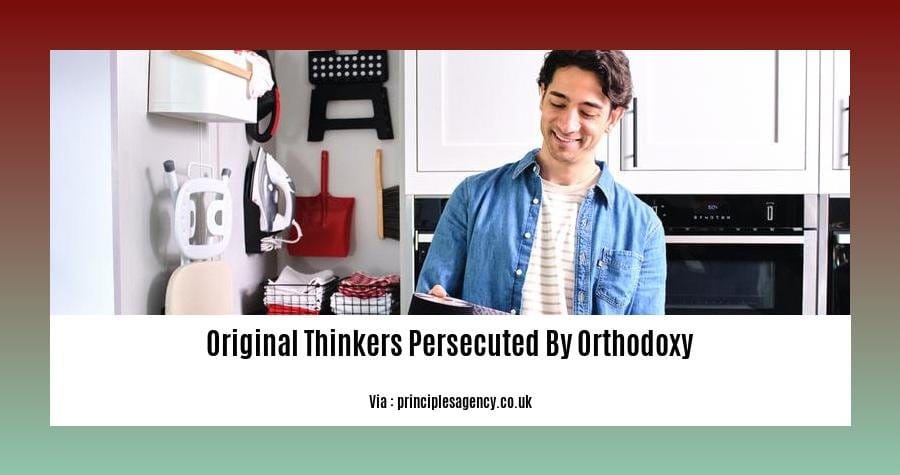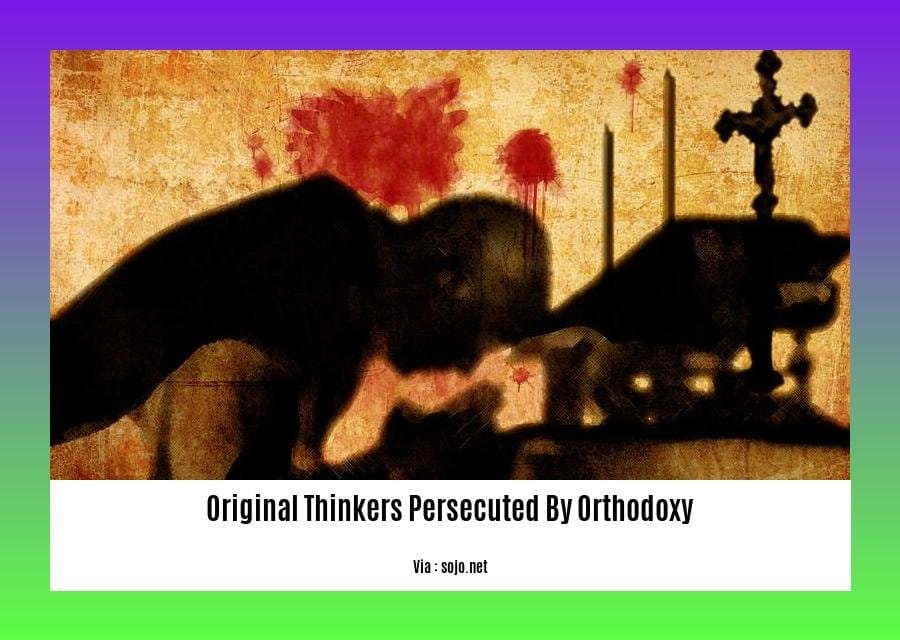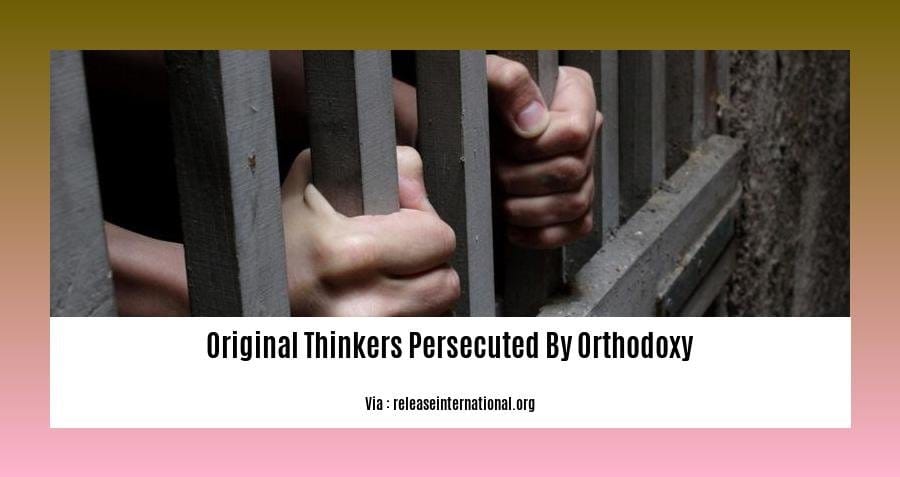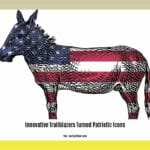Join us on a journey through history, as we delve into the compelling tales of Original Thinkers Persecuted by Orthodoxy: Tales of Intellectual Defiance. These extraordinary individuals dared to question prevailing beliefs, challenging norms and sparking revolutions in thought. Their unwavering pursuit of knowledge, despite persecution and adversity, serves as a testament to the indomitable spirit that drives human progress. Discover their struggles, triumphs, and enduring impact on our collective consciousness as we explore the fascinating lives of these intellectual trailblazers.
Key Takeaways:

- Lucilio Vanini faced execution for rejecting religious dogma, including the Trinity and miracles.
- Pietro d’Abano’s alleged sorcery led to accusations of heresy.
- Cecco D’Ascoli was excommunicated and burned for his beliefs in astrology and reincarnation.
- William of Ockham challenged religious authority and developed “Ockham’s Razor.”
- Meister Eckhart’s mystic teachings resulted in condemnation as a heretic after his death.
Original Thinkers Persecuted by Orthodoxy
Throughout history, original thinkers persecuted by orthodoxy have dared to challenge established beliefs, often at great personal cost. These courageous individuals have sparked intellectual revolutions, expanded our understanding of the world, and paved the way for progress.
Lucilio Vanini: The Heretic who Denied the Trinity
In 16th-century Italy, Lucilio Vanini’s belief in human evolution and rejection of miracles drew the ire of the Church. Despite his eloquent defenses, he was executed as a heretic, a testament to the Inquisition’s relentless pursuit of dissent.
Pietro d’Abano: The Sorcerer Accused of Witchcraft
Pietro d’Abano, a renowned physician and philosopher, faced accusations of sorcery in 13th-century Padua. Suspected of denying Christ’s divinity and practicing black magic, he was imprisoned and likely tortured before his death. His fate serves as a chilling reminder of the dangers of questioning prevailing beliefs.
Cecco D’Ascoli: The Poet Burned for Astrology
Cecco D’Ascoli, an Italian astrologer and poet, embraced astrology and reincarnation, beliefs that conflicted with Church doctrine. In 1327, he was excommunicated and burned at the stake for his heretical views, demonstrating the ferocity with which orthodoxy suppressed any challenge to its authority.
William of Ockham: The Philosopher who Challenged the Pope
William of Ockham, a 14th-century English philosopher, dared to question the authority of the pope and the Church. His ideas challenged the Church’s temporal power and paved the way for future reforms. Despite being condemned as a heretic, his work laid the groundwork for the Protestant Reformation.
Meister Eckhart: The Mystic who Believed in the Divinity of All
Meister Eckhart, a German mystic, believed in the inherent divinity of all beings. In the 14th century, his teachings were deemed heretical, and he was condemned posthumously. His writings continue to inspire mystics today, demonstrating the enduring power of ideas that challenge established norms.
These courageous original thinkers persecuted by orthodoxy remind us of the struggle for intellectual freedom and the price some pay for daring to question the status quo. Their stories inspire us to challenge assumptions, embrace critical thinking, and celebrate the power of ideas that transcend the boundaries of established beliefs.
Read about the pioneers who had to fight the establishment, whose radical ideas were suppressed by the mainstream.
The pioneering renegades who battled the system faced insurmountable challenges as they challenged the status quo and fought for their visions.
Discover the visionary innovators suppressed by the mainstream, whose groundbreaking ideas were met with resistance and opposition from the establishment.
Giordano Bruno: Condemned for advocating heliocentrism
Giordano Bruno, a Dominican friar turned heretic, dared to challenge the Catholic orthodoxy of his time by embracing heliocentrism, the theory that the sun, not the Earth, was the center of our solar system. His radical ideas sparked outrage within the Church, and he ultimately paid the ultimate price for his intellectual convictions.
Key Takeaways:
- Bruno’s bold defiance of the Church’s authority: Bruno rejected established teachings on eternal damnation, the Trinity, and the divinity of Christ.
- The tragic consequences of his beliefs: Bruno’s heretical views brought him into direct conflict with the Roman Inquisition, resulting in his trial and execution at the stake.
- The enduring legacy of his intellectual legacy: Despite his untimely end, Bruno’s ideas on cosmology and the infinity of the universe continue to inspire and challenge thinkers to this day.
Bruno’s unwavering pursuit of knowledge and his courageous stance against dogma serve as a poignant reminder of both the struggles and triumphs that can accompany intellectual innovation. He stands as an enduring symbol of the human quest for truth, even in the face of adversity.
Citation: “Giordano Bruno – Wikipedia.”
Galileo Galilei: Placed under house arrest for supporting Copernicanism
Galileo Galilei, an Italian philosopher, astronomer, and mathematician, arrived in Rome on February 13, 1633, to face charges of heresy.
Galileo faced charges for advocating the Copernican theory, which posits that the Earth revolves around the Sun. The Roman Inquisition formally tried Galileo in April 1633. To receive a lighter sentence, Galileo pled guilty.
Galileo was convicted of “vehement suspicion of heresy.” Galileo’s book, which supported the Copernican theory, was banned. Galileo was sentenced to prison but later had his sentence commuted to house arrest. Galileo spent the remaining nine years of his life under house arrest.
Key Takeaways:
- Galileo Galilei was an Italian philosopher, astronomer, and mathematician.
- He was tried by the Roman Inquisition for supporting the Copernican theory.
- He was convicted of “vehement suspicion of heresy.”
- His book, which supported the Copernican theory, was banned.
- He was sentenced to house arrest and spent the remaining nine years of his life under house arrest.
Citation:
The Inquisition of Galileo Is Launched Under Pope Urban VIII
Charles Darwin: Viciously criticized for his theory of evolution
Charles Darwin: A Beacon of Scientific Revolution
Despite his groundbreaking contributions to science, Charles Darwin’s theory of evolution ignited a firestorm of controversy. Darwin’s bold proposition that species evolve through natural selection challenged deeply held religious beliefs and social norms. This unleashed a torrent of criticism, ridicule, and even threats from various sectors of society.
The Church’s Wrath
Darwin’s theory clashed head-on with the prevailing religious dogma of the time. The church’s literal interpretation of the Bible placed the Earth’s creation at a mere 6,000 years ago, contradicting Darwin’s theory of evolution over millions of years. Clergymen denounced Darwin as a heretic and accused him of undermining the authority of God.
Social Outrage
Darwin’s theory also provoked outrage among conservatives who saw it as a threat to social order. The idea that humans evolved from lower animals challenged the prevailing belief in human superiority. Darwin’s work was labeled as “dangerous” and “immoral,” and many feared it would undermine social stability.
Scientific Skepticism
While some scientists recognized the potential significance of Darwin’s theory, many others remained skeptical. Darwin’s evidence was imperfect, and some scientists argued that his theory was too speculative to be accepted as scientific fact. The debate over evolution raged for decades, solidifying Darwin’s status as a lightning rod for controversy.
Despite the relentless criticism, Darwin’s theory of evolution ultimately prevailed. His scientific rigor and meticulous documentation laid the foundation for modern biology and forever changed our understanding of life on Earth. His legacy serves as a testament to the resilience of scientific inquiry in the face of intense opposition.
Key Takeaways:
- Darwin’s theory of evolution faced fierce opposition from the church, conservatives, and even some scientists.
- Religious beliefs and social norms clashed directly with Darwin’s ideas about the origin of species.
- Despite the criticism, Darwin’s theory ultimately revolutionized our understanding of life on Earth.
- Darwin’s legacy highlights the importance of scientific inquiry and the resilience of ideas in the face of opposition.
Relevant URL Source:

FAQ
Q1: How did original thinkers challenge prevailing orthodoxies?
Q2: What were the consequences of challenging orthodoxy?
Q3: Besides Galileo, who were other notable original thinkers persecuted for their ideas?
Q4: How did the persecution of original thinkers impact the progress of knowledge and intellectual inquiry?
Q5: Are there any parallels between the persecution of original thinkers in the past and challenges faced by intellectuals today?
- China II Review: Delicious Food & Speedy Service - April 17, 2025
- Understand Virginia’s Flag: History & Debate - April 17, 2025
- Explore Long Island’s Map: Unique Regions & Insights - April 17, 2025
















